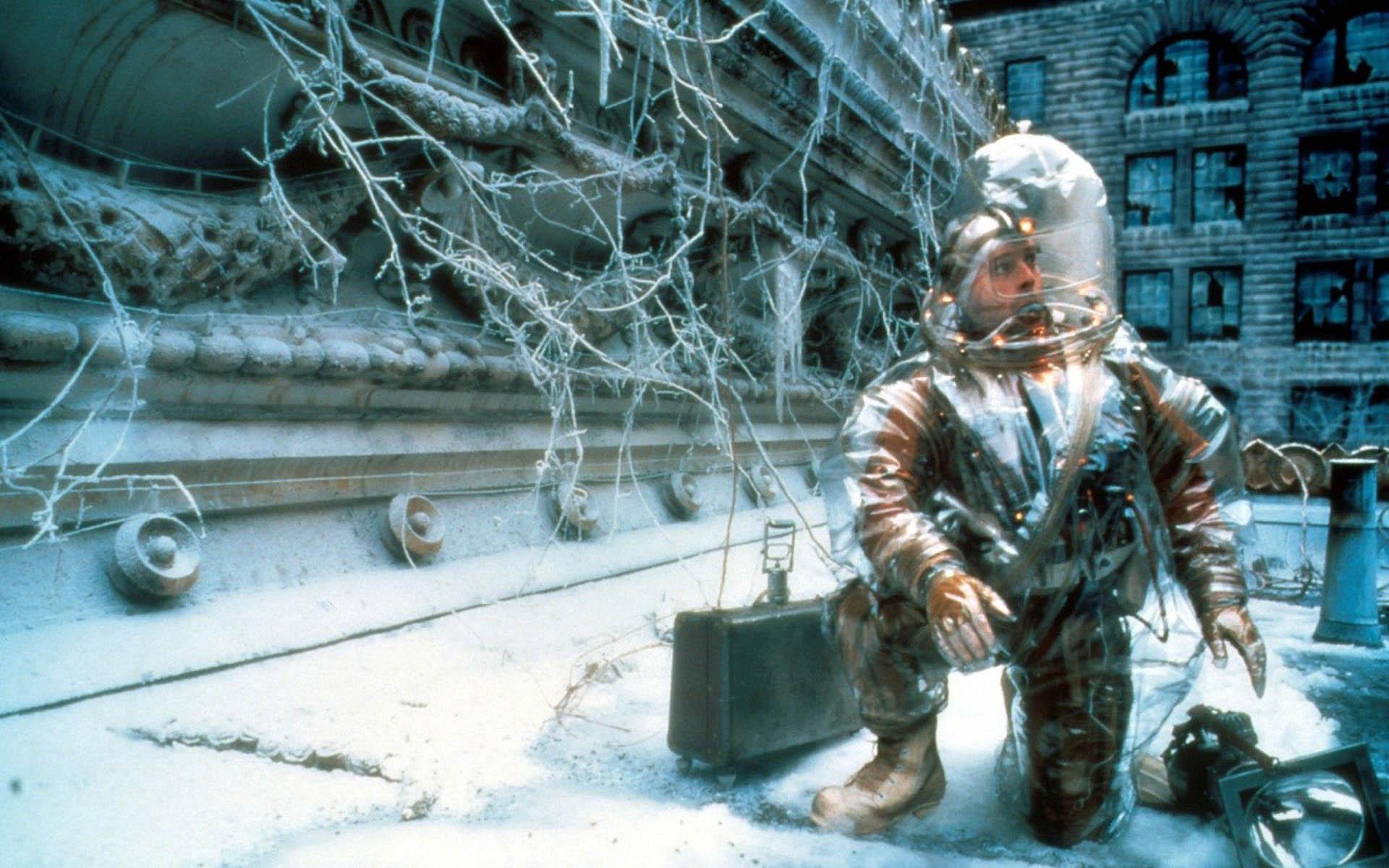Prediction and Imagination Won’t Solve Anything

Time travel of every kind is madness.
This essay contains spoilers for the movie 12 Monkeys.—Eds.
The more we come to fear that our lives after the pandemic will not remain the same, the more we desire to make them the same, either by ignoring the problem or by going back in time and preventing the catastrophe. Our technological achievements, from biological research to airports turned against us and spread the virus worldwide, while we largely ignored the problem. So we react by abandoning technology, isolating instead. And we wait.
Now’s a good time to revisit 12 Monkeys (1995), Terry Gilliam’s pandemic vision: Mankind exterminated and progress paralyzed by a deadly virus leaping from airport to airport. A terrifying future where we live in pods and eat bugs, while tyrant-scientists try their hand at time travel to test and trace the virus to its origin. Just like us! It all recalls Machiavelli’s warning in chapter III of The Prince: Without prudence, by the time the disease is visible, it’s already out of your hands…
Time Blindness
Gilliam’s film asks, what’s the difference between prophecy and madness? There’s always somebody warning you about the end of the world, after all, and once in a while, it happens…it’s either luck, and speaking at the right time, or prudence. But of course, only the prudent can tell the difference. We’re stuck with one curse or the other: blindness or hindsight. We either don’t know what’s happening or we ask ourselves, could we have done more?
This is the trap James Cole (Bruce Willis) is caught in as the protagonist of 12 Monkeys. He has to go back in time and learn about the epidemic, or hopefully even prevent it from happening. Stuck in the future, he can’t make sense of the past or deal with people he considers ghosts—he’s forced to watch as the past replays itself again and again, the people in it more like ghosts than flesh and blood. But in navigating the past, acting and making choices, he becomes as ignorant as everyone else. Time travel induces madness.
Still, Cole is able to see our world from a distance, and to gain a vista on the madness of the times. Bruce Willis is arrested and thrown into an asylum because he’s not well-adjusted—but the movie shows that being well-adjusted, the psychological ideal of liberalism, means denying there’s anything to fear. Liberalism asks us to trust in systems we don’t understand and refuse to judge events for ourselves. It also turns out to mean living by the fantasies TV advertises.
The film’s more “well-adjusted” characters work in secret laboratories studying deadly viruses which may equally save or doom humanity—there’s no way to tell which. There’s immense power there, exercised by people like ourselves and so just as ignorant as us of what will come of their actions. We trust that everything will work out perfectly with our technological powers, and if it doesn’t, it’s time to pray or maybe get lucky. Our imprudent experts live by fantasies, too…
Liberalism and Despair
So, in the movie and outside of it, there are good reasons not to be well-adjusted. But nobody can say that publicly, of course. Instead, liberal piety answers our secret fears with love of animals—the more we fear we are evil, the more we turn to animals as innocent. Nature, without us, might be good. In 12 Monkeys, that’s Jeffrey Goines (Brad Pitt)—the beautiful, wild, rebellious son of Mr. Science with power over life and death, the genteel Dr. Goines played by Christopher Plummer. Behind both, however, is love of death.
One of the father’s lackeys—one who does not get honors or inheritance like the son—decides to take his revenge on mankind for his rejection. That’s the film’s reveal and the villain completing this unholy trinity, spreading the disease, the ghoulish Dr. Peters played by David Morse. His plan was to sacrifice human beings to prove how stupid and blind we all are, releasing the virus to prove he was right all along. If we can self-destruct, he reasons, we must. We’re too base to deserve to live.
You might say well, it’s just a movie, they made up a villain! We certainly assume our pandemic was spread innocently, ignorantly. Perhaps fearful people didn’t tell the truth about where they traveled. That’s irresponsibility, so we’re ok with authorities fining or even arresting people. But surely no one would do anything evil! It’s funny: In the worst epidemic in a century, we’re so sure no one could have done anything evil…
In our plea for innocence, we become like the animals we imagined as innocent. This is the movie’s secret: Bruce Willis is supposed to learn that the 12 monkeys were and were not responsible for the onset of the epidemic. Beyond the fantasies of the well-adjusted who denied the epidemic would come, beyond the reassuring T.V. fantasies helping us ignore the world, there is one more fantasy that separates us from our bodies: the denial of evil.
No Exit
Disease is important because it reminds us of our bodies, our weakness, our mortality, our fears—it’s not a technological or institutional problem you can solve through some more science, natural or political. If you get sick, you will likely lose your mind—maybe your life, too. Fantasy then fails. You cannot jump outside of your experience and indulge in time travel.
You can treat our epidemic as a revelation of institutional failures we need to fix, and medical ignorance, and all that. And this is true as far as it goes. But it cannot bring back the dead. It cannot even prevent people dying today, tomorrow, next week, next month. Even science, as much as the rest of our media, tempts us to believe the lie that we can know the unknowable, playing with models that go back and forward in time without consequences for ourselves.
So it’s not an accident that 12 Monkeys connects time travel to madness and madness to tragedy, to a man who decides to be a hero and learns he has to pay a price for his belief, that he can change the past. When we look to a scientific or political savior, that’s what we’re looking for. When we look away from catastrophe, that’s what we think we are accomplishing. These are fantastic solutions to real problems.
12 Monkeys is not about time travel, but about our desire to travel back in time, to deal with guilt and with shame, to avoid failures rather than learn from them. That the climax seems to be an accident, since hero and villain meet by chance—or by a necessity they ignore—is not itself an accident. Our hero wanted to escape with his beautiful lover to paradise, the Florida Keys: That’s an image of death.
Watch 12 Monkeys, and watch it again. It reproduces necessity, since it has a beginning, middle, and end, each event following as it must—even though it’s based on the promise that we can repeal necessity, travel in time, skip around, reach the happy end. The skipping forward and backward in time, between dream and reality, between guess and discovery, follows a sequence of revelation, an inescapable necessity that promises us we can learn better.
Terry Gilliam asks to remember the past, to remember ourselves, to retrieve the things we forgot or lost when we embraced our most beloved, most successful fantasies. This American crisis, the pandemic, and this all-American hero’s tragedy, driven by his love and by scientific masters, will help us put two together. Back in 1995, 12 Monkeys grossed almost $170 million, but we didn’t learn much. Since we’re doing the time, we might as well do the crime as well, and learn.
The American Mind presents a range of perspectives. Views are writers’ own and do not necessarily represent those of The Claremont Institute.
The American Mind is a publication of the Claremont Institute, a non-profit 501(c)(3) organization, dedicated to restoring the principles of the American Founding to their rightful, preeminent authority in our national life. Interested in supporting our work? Gifts to the Claremont Institute are tax-deductible.
Voters are growing sick of being sold as news.
Every nation is shaped by its canon. It’s time to shape America’s.






